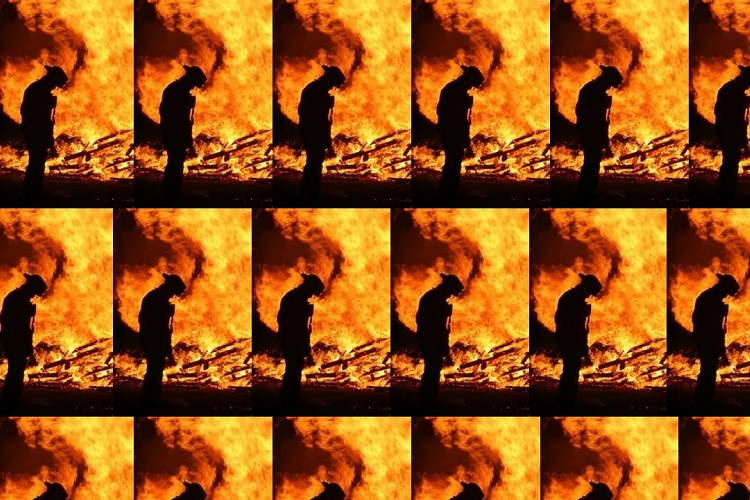

By Anne Gagliano
You may think I’m a bit preoccupied with this topic—stress. I suppose I am. Maybe it’s because I’ve been a firefighter’s wife for 31 years; my husband Mike deals with extreme stress for a living. First responders get a steady dose of traumatic, life-altering events 24/7. It’s exhilarating, meaningful work—saving lives and helping people—but it’s impactful as well. My firefighter sometimes has trouble relaxing, and his struggles are mine. All Americans worry about money, work, family, and health; but for the firefighter, whose work is stress, the impact is exponential.
In my last column, I offered 10 signs that stress may be getting too high in the form of a little “stress test.” Now, I wish to share 5 ways my firefighter and I cope with it. They’ve proven over the past three decades of our experience in this high-stress fire life to be most helpful when we actually do them and quite noticeable when we don’t. I hope they help keep you, our firefighter family, from going over the edge as pressures mount. Though you are indeed “superhuman” at times—firefighters, please remember that you are, for the most part, only human. Please don’t overdo, and try to incorporate some of these stress-beating tips into your life:
Exercise: Exercise is the only effective way to burn off stress hormones triggered in the fight-or-flight response. All firefighters should exercise on a regular basis to eliminate these hormones and their devastating effects, including digestive suppression, immune system suppression, raised blood pressure, sleep issues, and all the other 10 signs of high stress mentioned in Part 1. Stress has a physical impact on the body; it takes a physical solution to counter it.
Burning off stress hormones will improve sleep, digestion, immunities, mood, and so on. It is a simple, inexpensive solution to a serious problem. Better than drugs or alcohol, it will help you relax and come down after the extreme high of an adrenaline rush. And it’s healthier for your marriage as well, as addictions interfere with intimacy. (For a more in-depth look at exercise, read my previous columns “Why Firefighters and Their Spouses Should Exercise, Parts 1, 2, and 3.”)
Prayer/Meditation: Stress is a physical response to a mental stimulant—i.e., danger or trauma. Hence, it is in both arenas that it must be dealt with—the body and the mind. Danger is often real—for the firefighter especially—but it can also be imagined. This we call “worry.” Worry takes reality into the next realm; it puts stress on steroids. We often dwell on the worst-case scenarios and fear that disaster awaits around every corner. And real trauma can be ongoing if we don’t learn how to master it, to bounce back from it, to let it go.
Enter the beauty of prayer, or as today’s modernists like to call it, “meditation.” As the wise King Solomon once said, “There is nothing new under the sun.” All kinds of “new studies” are showing the incredible health benefits of meditation; but those of us who are religious know this—that prayer has been around since the beginning of time and a loving God tells us to practice it daily for a reason.
What is prayer? It is closing your eyes in a quiet place; perhaps bowing your head, even getting down on your knees, and in the stillness of your mind—conversing with God. This is what Mike and I do; we’re believers—we tell God our troubles and ask Him to help. We thank Him for the blessings in our life as we name them one by one and trust Him with our problems. God tells us to do this in the Old and New Testament; but scientists today are telling us to do it too, as the benefits are astounding. They prefer to call it “meditation” or even “mindfulness” because it is more politically correct (quietness minus God). They describe it as spending time each day “in a peaceful place” thinking of good things and escaping from negative thoughts. Call it what you will, prayer or meditation, and adapt the concept to your own beliefs. But please—if you’re stressed, just give it a try. A few minutes a day is all it takes.
A study by Johns Hopkins University showed that “meditation/prayer” may be “just as effective as antidepressants for treating symptoms of anxiety.” And doctors from all prominent hospitals now regularly recommend it for conditions like insomnia and irritable bowel syndrome (IBS), as it is proven to do the following: calm the nervous system; tamper down fight-or-flight response hormones; lower blood pressure; and release the feel-good chemicals serotonin, dopamine, and endorphins, just as in exercise. The mind is truly powerful. Those who pray/meditate regularly also report feeling 40 percent less pain as the feel-good chemicals released reduce inflammation. And when the body relaxes (during prayer/meditation), the immune system and the digestive system are rebooted by the parasympathetic nervous system, which is transcendent when the body is relaxed.
Professional “meditators” say to be effective you must “be still.” Psalm 46:10 says this too: “Be still and know that I am God.” What does “be still” mean? It comes from the Hebrew word rapa, which is “to slacken, let down, cease, or stop frantic activity as in fighting.” To “know” God is to trust Him to fight the battles you cannot possibly win. And the most beneficial meditations? Grateful thoughts–to list all that you’re thankful for, to count your blessings. In an article published in Time magazine entitled “What Gratitude Can Do For You,” Louisa Kamps writes: “A gratitude practice has also been associated with improved kidney function, reduced blood-pressure and stress-hormone levels and a stronger heart…You’ll be more resilient: When we notice kindness and other gifts that benefit us, our brains become wired to seek out the positives in any situation, even dire ones. As a result, we’re better at bouncing back from loss and trauma.”
Those who deliberately look for the good will find it. They will not be overwhelmed by the bad. It is impossible to be grateful and despondent at the same time. Be still (meditate), trust God (if you believe in God), and give thanks every day; it’ll make you healthier, happier, and more resilient to stress—even the traumatic stress of a firefighter. Those who know my husband Mike well often say what a positive, happy person he is. This is a choice; it comes from years of regular prayer. He has well learned to let God fight the battles he cannot possibly win. His stress levels (and mine) rise when he forgets this truth and tries to take on the world himself. Be still—and remember, you are not God. You don’t have to fight every battle alone.
In my next column, I’ll list the final three ways my firefighter and I cope with stress.
Anne Gagliano has been married to Captain Mike Gagliano of the Seattle (WA) Fire Department for 31 years. She and her husband lecture together on building and maintaining a strong marriage.


